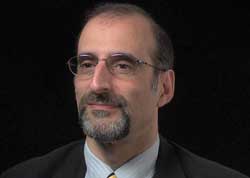Filed Under > Research/Publications
Preparing Educators to Think About Health
In this year's Tisch lecture, Howell Wechsler calls on TC and other schools of education to embrace health as part of their mission
But Wechsler –Director of the Division of Adolescent and School Health at the U.S. Centers for Disease Control and Prevention (CDC), and this year’s Tisch Lecturer at TC – sees some new reason for hope, much of which has to do with work emanating from Teachers College.
2013 Tisch Lecturer at TC
Watch Howell Wechsler talk about school health in TC's "Mini Moments with Big Thinkers" series.
At the start of a lecture he delivered in February, “Taking Action Now to Address the Missing Link in School Reform,” Wechsler held up the October 2011 issue of the Journal of School Health, the entirety of which was devoted to a group of articles titled “Healthier Students Make Better Learners,” written by Charles E. Basch, TC’s Richard March Hoe Professor of Health Education.
“This report has led to unprecedented amounts of attention placed on the need for strong school health programs,” Wechsler told listeners in Milbank Chapel. “And not just because they’re good for our children, but because they’re an essential strategy for improving academic achievement – especially for those kids struggling in school.”
Basch’s report documented the extent of seven health issues – vision, asthma, teen pregnancy, aggression and violence, physical activity, breakfast, and inattention and hyperactivity – that disproportionately affect low-income, minority youth, and detail the specific ways that these problems contribute to the nation’s school achievement gap. A concluding paper called for schools to make student health a fundamental part of their mission and outlined a strategy for combating these issues with school health programs coordinated by an extensive cast of national, regional and local players. Basch has since met with health and school officials around the country to gain support for that idea, which another TC faculty member, Aaron Pallas, has called “so obvious that you wonder why it hasn’t been tried before.”
As a TC alumnus, Wechsler said, that he was “proud that this document came from my alma mater.” But for Basch’s plan to succeed, he said, schools of education, too, must make student health a fundamental part of their missions. He called on TC to work with health experts to codify what teachers and administrators need to know – in particular, how and why specific health problems interfere with learning – and to lead the way in strengthening the preparation of teachers and administrators for addressing health-related barriers to learning.
Specifically, teachers in pre-K-12 schools must learn to identify students who need health services and communicate with school nurses and principals to help students get access to those services, Wechsler said. Teachers should also learn to integrate health content into different subject areas; help students learn skills for communicating effectively and resolving conflict; and communicate with parents about health-related barriers to learning.
While it may not be clear yet what all the components should be in bringing health education to schools, Wechsler said, “A place like TC, with so many brilliant minds, can figure it out as well as anyone.” He closed by quoting the Jewish philosopher Hillel – “If not now, when?” – and added, “If not the nation’s oldest, largest and greatest college of education, then who?”
Wechsler has announced that after 18 years at CDC -- including nine in his current role -- he will leave in May to begin a new position outside the government, as Chief Executive Officer of the Alliance for a Healthier Generation. The Alliance promotes physical activity, healthy eating and obesity prevention among young people. Its Healthy Schools Program is helping schools across the Nation build the capacity to address critical health problems.
Published Thursday, Mar. 28, 2013
